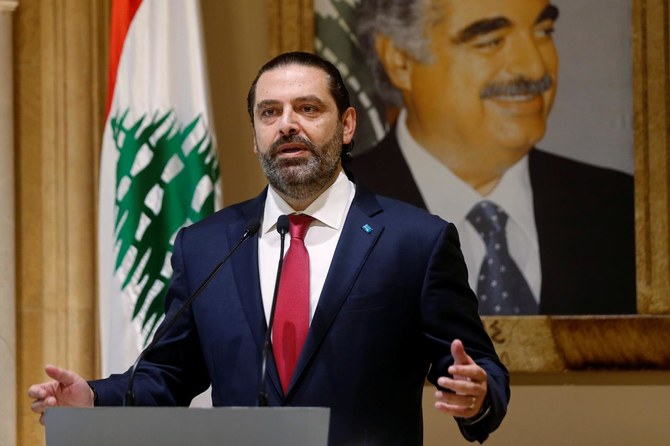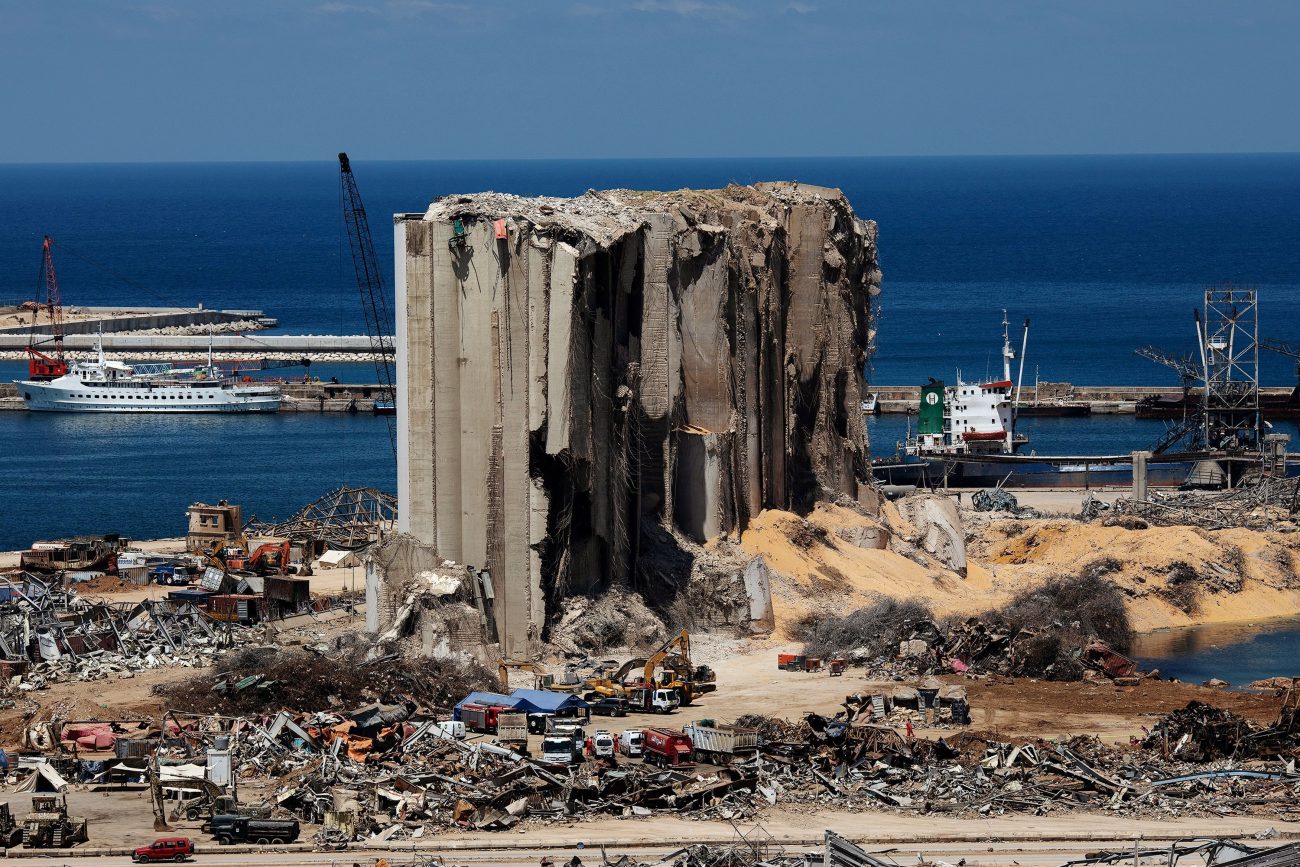
by NAJIA HOUSSARI -- arabnews -- BEIRUT: Lebanese President Michel Aoun said on Thursday that he plans to include “competent figures representing the voice of the street” in the new government. Ten days after Prime Minister Hassan Diab’s government resigned in the wake of the Beirut port blast, Aoun is yet to set a date for parliamentary consultations to name a leader for the next government. In a tweet on Thursday, he added that it is not clear if talks will take place soon. Diab’s government stepped down amid widespread public anger following the port explosion that devastated Beirut, killing 180 people and causing widespread damage. Opponents of Diab’s leadership claim it was a “shadow government” dominated by Hezbollah that failed to carry out reforms demanded by the international community.
Parliament Speaker Nabih Berri is fighting to restore Saad Hariri as prime minister. Hariri’s government of national unity resigned in October, 2019, after violent protests broke out amid claims of growing government corruption. Protesters called for a transitional government to implement reforms demanded by the global community to help Lebanon overcome its economic crisis. Aoun and Berri held a meeting two days ago in which the parliament speaker suggested Hariri return to the leadership. MPs have reported Berri saying that he considers Hariri “the perfect man for the stage.” Berri also claims that he has Hezbollah’s backing for Hariri. Sources say he is insisting on a political government, not a technocratic one, and wants Hariri to provide it with an acceptable cover in light of the political and economic crises facing Lebanon.

BAABDA, Lebanon (CNS) -- By Doreen Abi Raad -- — U.S. Daughter of Charity Sister Ann Sauvé, a member of the administrative staff at the order’s Sacred Heart Hospital in this Beirut suburb, will not easily forget Aug. 4 and the massive explosion in the port of Beirut. “I can still recall a mass of people sitting or lying on stretchers — sometimes even on the floor — waiting patiently for their turn, not really asking for anything, without complaints, and perhaps not even knowing if they still had a home, or, in some cases, if they had lost a family member,” Sister Ann told Catholic News Service. “We cared for them as efficiently as possible, but it took time and many had to wait for their turn. When they were able to leave after receiving the necessary care, it was always with a quiet and sincere ‘thank you.’ The next day, visiting them in their hospital room, it was again their thanks that we heard, despite their shock and their suffering. … an experience I will never forget,” said Sister Ann, who has served in the Middle East since 1976, most of the time in Lebanon, but also in Egypt and Jerusalem.
The hospital received about 200 people in its emergency room that night. The explosion killed more than 170 people and wounded more than 6,000. “At the hospital, medical corps, administration, maintenance, pharmacy, technicians worked together calmly and as peacefully as possible, each giving their best. We were so touched by the messages that came in from nearly all over the world: people sharing their grief with us and assuring us of their prayers,” Sister Ann said. One of the victims of the blast was 76-year-old Daughter of Charity Sister Sophie Khosrovian, who was from Iran. “Toward the beginning of the evening, someone told me that Sister Sophie was wounded. The emergency room at that time was very crowded, and I could not find her. Then someone informed me that her condition was very critical, she had been intubated and sent immediately to the Intensive Care Unit. But Sister Sophie did not respond to resuscitative efforts and died of her injuries about three hours after her admission,” Sister Ann said.

by thehill.com -- Laura Kelly -- The U.S. will continue to provide humanitarian support for the Lebanese people affected by a deadly and devastating explosion at the port of Beirut in early August, a top State Department official said Wednesday, but will not underwrite the current government until real reforms take place. David Hale, the under secretary for political affairs, spoke candidly about Lebanese government corruption and incompetence in a briefing with reporters following a recent trip to the region. He said while the U.S. remains committed to addressing the immediate humanitarian crisis — the U.S. has so far provided $18 million in emergency assistance — it will not provide a bailout for the Lebanese government.
“We will not be providing that kind of long-term assistance until we see a government that's actually capable of reform and change,” Hale said. He further criticized the government, saying that Lebanon’s leaders “have been ignoring their responsibility to meet the needs of the people and have resisted the kind of deep, fundamental reforms that are needed.” He added that “we can't fix that from the outside. Lebanese leaders have to demonstrate the political will and commitment to that and that was my main message.” Lebanon has been viewed as a country on the brink of collapse even before the Aug. 4 blast amid an economic crisis worsened by the COVID-19 pandemic. The source of the blast is believed to be from a fire at the city’s port that spread to nearly 3,000 tons of abandoned and improperly stored, highly-explosive ammonium nitrate. The explosion killed nearly 200 people, injured thousands and left hundreds of thousands of people with destroyed homes.

by foreignpolicy.com -- BY ANCHAL VOHRA -- There is a saying in Lebanon that the country functions better without a government than with one. That has never been truer than now. Minutes after the explosion ripped through Beirut on Aug. 4, Red Cross medics appeared on the street with first aid kits, and volunteers managed traffic. Young men and women carrying water bottles went door to door asking if anyone needed help. Lebanon’s conflict-ridden past, riddled with wars and invasions, economic collapse, and rampant corruption, has steadily trained citizens to spring into action when confronted with an emergency. Within a week of the explosion that wreaked havoc in the capital, they cleaned the city’s roads, which had been made impassable with broken glass and debris.
Of course, in any other country, the army and disaster management officials would have also rushed to the spot of the explosion; politicians would have lined up to offer condolences and support. But here the state was conspicuously absent. Instead, President Michel Aoun imposed a state of emergency and granted the army expansive powers to curb freedom of movement, press, and assembly to boot out angry protesters from the streets. The Lebanese people have been both first responders and victims of their government’s response. Mounds of shattered glass, wood, and entangled metal, mixed with household items such as half-torn books, contorted utensils, and photographs, now fill the sidewalks of the neighborhoods that were, before the blast, the heart of the city. The volunteers who wielded brooms and shovels through the Christian-dominated neighborhoods of Gemmayze and Mar Mikhael hailed from across the country’s religious sects. Two groups of scouts, one from the Sunni-dominated northern city of Tripoli wearing maroon vests, and one from the Shiite south in green, were busy sweeping damaged houses. (The state was nowhere in sight: Police officers merely guarded the entry to the road and roped off a building that was in danger of collapse.)
Khazen History


Historical Feature:
Churches and Monasteries of the Khazen family

St. Anthony of Padua Church in Ballouneh
Mar Abda Church in Bakaatit Kanaan
Saint Michael Church in Bkaatouta
Saint Therese Church in Qolayaat
Saint Simeon Stylites (مار سمعان العامودي) Church In Ajaltoun
Virgin Mary Church (سيدة المعونات) in Sheilé
Assumption of Mary Church in Ballouneh
1 - The sword of the Maronite Prince
2 - LES KHAZEN CONSULS DE FRANCE
3 - LES MARONITES & LES KHAZEN
4 - LES MAAN & LES KHAZEN
5 - ORIGINE DE LA FAMILLE
Population Movements to Keserwan - The Khazens and The Maans
ما جاء عن الثورة في المقاطعة الكسروانية
ثورة أهالي كسروان على المشايخ الخوازنة وأسبابها
Origins of the "Prince of Maronite" Title
Growing diversity: the Khazin sheiks and the clergy in the first decades of the 18th century
Historical Members:
Barbar Beik El Khazen [English]
Patriach Toubia Kaiss El Khazen(Biography & Life Part1 Part2) (Arabic)
Patriach Youssef Dargham El Khazen (Cont'd)
Cheikh Bishara Jafal El Khazen
Patriarch Youssef Raji El Khazen
The Martyrs Cheikh Philippe & Cheikh Farid El Khazen
Cheikh Nawfal El Khazen (Consul De France)
Cheikh Hossun El Khazen (Consul De France)
Cheikh Abou-Nawfal El Khazen (Consul De France)
Cheikh Francis Abee Nader & his son Yousef
Cheikh Abou-Kanso El Khazen (Consul De France)
Cheikh Abou Nader El Khazen
Cheikh Chafic El Khazen
Cheikh Keserwan El Khazen
Cheikh Serhal El Khazen [English]
Cheikh Rafiq El Khazen [English]
Cheikh Hanna El Khazen
Cheikha Arzi El Khazen
Marie El Khazen